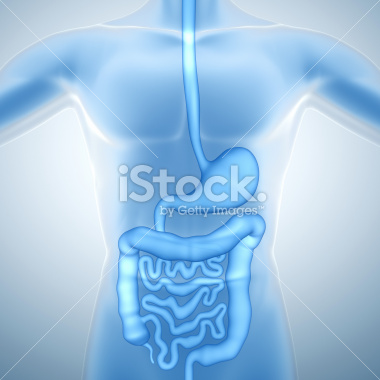Crohn’s Disease
 What is Crohn’s disease?
What is Crohn’s disease?
Crohn’s disease is an autoimmune disorder in which your digestive tract becomes inflamed, or swollen, anywhere from the esophagus to your rectum. The disease is unique to each individual in the sense that different areas of your digestive tract will be affected. Crohn’s disease is classified as an Inflammatory Bowel Disease
(IBD).
In Crohn’s disease, inflammation extends deep into the lining of the affected part of the GI tract. Swelling can cause pain and diarrhea, and chronic
(i.e. long lasting) inflammation may produce scar tissue that builds up inside the intestine to create a stricture. A stricture is a narrowed passageway that can slow the movement of food through the intestine, causing pain or cramps.
What causes Crohn’s disease?
It’s unclear as to what causes Crohn’s disease, but we do know that it’s an autoimmune disorder in which the body’s immune system responds negatively to the bacteria in your intestine.
Both men and women can be equally affected by Crohn’s disease. People with Crohn’s disease may have a biological relative, such as a brother or sister, with some form of inflammatory bowel disease.
You have a higher chance of contracting Crohn’s disease if it runs in your family and if in addition you are a smoker. Researchers have also found that those who suffer from Crohn’s disease have higher levels of a specific protein called
“Tumor Necrosis Factor”.
Researchers have been unable to pinpoint an exact cause of Crohn’s disease but have discovered that several factors play a role in its development including a person’s genes, immune system, and the environment.
What are the symptoms of Crohn’s disease?
The symptoms of Crohn’s disease vary widely, but the severity of the pain can often times be debilitating. Symptoms are directly related to where the inflammation acts in your digestive tract and include:
- Diarrhea
- Weight loss
- Loss of appetite
- Abdominal pain and discomfort
- A feeling of fullness in your abdomen
- Fever
- Ulcers
- Blood in your stool or rectal bleeding
Crohn’s disease is a disease that cycles through periods of remission and periods of limited to no symptoms. Recurrences can range in severity from mild to severe, debilitating pain.
How is Crohn’s disease diagnosed?
Crohn’s disease can be difficult to diagnose because its symptoms are similar to other intestinal disorders, such as ulcerative colitis and irritable bowel syndrome. For example, both ulcerative colitis and Crohn’s disease can cause abdominal pain and diarrhea.
Dr. Khorrami will perform a thorough physical exam and schedule a series of tests to diagnose Crohn’s disease.
Blood tests
These can be used to look for anemia caused by bleeding. Blood tests may also uncover a high white blood cell count, which is a sign of inflammation or infection somewhere in the body.
Stool tests
These are commonly done to rule out other causes of GI diseases, such as infection. Stool tests can also show if there is bleeding in the intestines.
Dr. Khorrami may also perform the tests below to further help in accurately diagnosing your condition.
Sigmoidoscopy and colonoscopy
These tests are used to help diagnose Crohn’s disease and determine how much of your digestive tract is affected, if any. Colonoscopy is the most commonly used test to specifically diagnose Crohn’s disease. Colonoscopy is used to view the ileum, rectum, and the entire colon, while sigmoidoscopy is used to view just the lower colon and rectum.
Biopsy
A procedure that involves taking a small tissue sample of intestinal lining for examination with a microscope. The process is painless and you will not feel the biopsy.
Upper GI series
An upper GI series may be performed to look at your small intestine for signs of abnormalities. You may experience bloating and nausea for a short time after the test.
Lower GI series
A lower GI series may be performed to look at your large intestine. A laxative or enema may be used before the test. A laxative is medication that loosens stool and increases bowel movements. An enema involves flushing water, laxative, or sometimes a mild soap solution into the anus using a special squirt bottle.
The tests below are performed at a hospital or outpatient center by an x-ray technician and a radiologist interprets the images.
Computerized tomography (CT) scan
CT scans use a combination of x-rays and computer technology to create three-dimensional (3-D) images. For a CT scan, the person may be given a solution to drink and be injected with a special dye, called contrast medium. CT scans require the person to lie on a table that slides into a tunnel-shaped device where the x rays are taken. CT scans can be used to help diagnose Crohn’s disease.
Are there any complications with Crohn’s disease?
Because Crohn’s disease causes swelling and inflammation, people may experience an intestinal blockage or develop ulcers. Intestinal blockages are common and are caused because your intestinal wall becomes narrowed due to scar tissue and swelling. You may also suffer from ulcers.
Crohn’s disease may also cause patients to have trouble absorbing nutrients, which could result in vitamin deficiencies. Those with Crohn’s disease may suffer from anemia either because of the disease itself or because of iron deficiency.
Tunneled connections, called fistulas, are another common complication of Crohn's disease. When fistulas form in the areas around the anus and rectum they can sometimes become infected. Most fistulas can be treated with medication, but some may require surgery. In addition to fistulas, small tears called fissures may develop in the lining of the mucus membrane of the anus. These can be treated with topical creams and soaking the affected area in warm water.
Some people with Crohn’s disease may have restless legs syndrome—extreme leg discomfort a person feels while sitting or lying down. Some of these problems clear up during treatment for Crohn’s disease, but some must be treated separately.
Arthritis, kidney stones, gallstones, liver diseases, and skin problems are other problems that can be associated with Crohn’s disease.
How to treat Crohn’s disease?
Treatment of Crohn’s disease varies between individuals but especially depends on three factors: location, severity, and complications. There is no definitive cure to Crohn’s and treatment is focused on keeping the disease in remission. Some people need to make regular visits to a doctor, while others are able to remain symptom-free for months and sometimes years. This changing pattern of the disease makes it difficult to be certain a specific treatment has helped.
It’s worth noting that many people suffering from Crohn’s disease are able to live full, normal lives balancing their jobs, friends, family, and activities.
Medications
Anti-inflammation medications
Most people are first treated with medications containing mesalamine, a substance that helps control inflammation. Sulfasalazine is the most commonly used of these medications.
Cortisone or steroids
These medications, also called corticosteroids, aim at reducing inflammation. A popular example of a corticosteroid is Prednisone. During the earliest stages of Crohn’s disease, when symptoms are at their worst, corticosteroids are usually prescribed in a large dose. The dosage is then gradually lowered once symptoms are controlled.
Immune system suppressors
These are medications that suppress the immune system. The most commonly prescribed medications are 6-mercaptopurine and azathioprine. Immunosuppressive medications work by blocking the immune reaction that contributes to inflammation. Some people are treated with a combination of corticosteroids and immunosuppressive medications.
Biological Therapies
Biological therapies are medications given by an injection in the vein, infliximab (e.g. Remicade), or an injection in the skin, adalimumab (e.g. Humira). Biological therapies bind to TNF substances to block the body’s inflammation response. The U.S. Food and Drug Administration approved these medications for the treatment of Crohn’s disease that does not respond to other treatments, such as mesalamine substances, corticosteroids, immunosuppressive medications, and for the treatment of open, draining fistulas. Some studies suggest that biological therapies may enhance the effectiveness of immunosuppressive medications.
Antibiotics
Antibiotics are used to treat bacterial overgrowth in the small intestine caused by stricture, fistulas, or surgery.
Anti-diarrheal medications and fluid replacements
Diarrhea and abdominal cramps are often relieved when the inflammation subsides, but additional medication may be needed. Anti-diarrheal medications include diphenoxylate, and loperamide. People with diarrhea should drink plenty of fluids to prevent dehydration. Intravenous fluids may be used in severe cases that do not respond well to other treatments.
Surgery
If medication does not seem to be working, then surgery may be recommended. Roughly two-thirds of people with Crohn’s disease will undergo surgery at some point in their life. It should be noted that surgery does not eliminate Crohn’s disease. People with Crohn’s disease may need more than one operation because inflammation tends to return to the area next to where the diseased intestine was removed. The option of a second surgery should especially have its positives and negatives weighed out.
The doctor may prescribe calcium, vitamin D, and other medications to prevent or treat osteoporosis for patients taking corticosteroids. People should take vitamin supplements only after talking with their doctor.
Eating, Diet, and Nutrition
There is no special diet that has been proven effective for treating Crohn’s disease, but keeping a strict regimen of eating healthy nutritious foods may provide relief. It is important to find out and avoid any foods or drinks that seem to cause you symptoms.
Foods such as bulky grains, hot spices, alcohol, and milk products may increase diarrhea and cramping. Those who suffer from Crohn’s disease typically have a decreased appetite, which can lead to a lack of nutrition. Lack of nutrition can lead to other complications.
Does smoking worsen Crohn’s disease?
Studies have shown that those who smoke may have more severe symptoms and increased complications of the disease. You are also a better candidate for surgery. Quitting smoking can greatly improve the course of Crohn’s disease and help reduce the risk of complications and recurrences.
Does stress worsen Crohn’s disease?
No evidence shows that stress causes Crohn’s disease. However, people with Crohn’s disease sometimes feel increased stress in their lives because they suffer from a chronic illness. For people who find there is a connection between stress level and a worsening of symptoms, using relaxation techniques, such as slow breathing, and taking special care to obtain enough sleep may provide relief.
Is pregnancy safe for women with Crohn’s disease?
Women with Crohn’s disease can become pregnant and have a baby. Most children born to women with Crohn’s disease are not affected by the condition. You should consult your doctor about any complications that may arise from pregnancy and Crohn’s disease.
Should I see a Gastroenterologist?
Gastroenterologists are doctors who specialize in treating any problems that may arise in your digestive tract. For Crohn’s disease, it’s especially important for you to stay in touch with your gastroenterologist to closely monitor your symptoms and see what’s working and what isn’t. Dr. Khorrami has been a
practicing gastroenterologist for over 15 years and would be more than happy to help restore your quality of life.
Source contains material from the National Digestive Diseases Information Clearinghouse (NDDIC).
 What is Crohn’s disease?
What is Crohn’s disease?